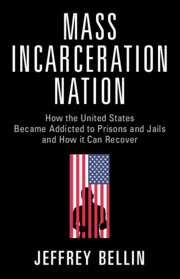 Mass Incarceration Nation
Mass Incarceration Nation Published online by Cambridge University Press: 03 November 2022
In 2019, the United States locked up almost 2 million people. And there is no simple explanation for what is going on. There were 196,300 people imprisoned for homicides and another 176,300 people in prison for drug offenses. Each of those numbers is close to three times the entire prison population of countries like France (75,000) or Germany (60,000), and each number rivals the United States’ total prison population in the early 1970s (200,000). Add in all the people incarcerated for other crimes, and those awaiting trial in jail, and you get 2 million – a number that would have been incomprehensible fifty years ago.1
To save this book to your Kindle, first ensure [email protected] is added to your Approved Personal Document E-mail List under your Personal Document Settings on the Manage Your Content and Devices page of your Amazon account. Then enter the ‘name’ part of your Kindle email address below. Find out more about saving to your Kindle.
Note you can select to save to either the @free.kindle.com or @kindle.com variations. ‘@free.kindle.com’ emails are free but can only be saved to your device when it is connected to wi-fi. ‘@kindle.com’ emails can be delivered even when you are not connected to wi-fi, but note that service fees apply.
Find out more about the Kindle Personal Document Service.
To save content items to your account, please confirm that you agree to abide by our usage policies. If this is the first time you use this feature, you will be asked to authorise Cambridge Core to connect with your account. Find out more about saving content to Dropbox.
To save content items to your account, please confirm that you agree to abide by our usage policies. If this is the first time you use this feature, you will be asked to authorise Cambridge Core to connect with your account. Find out more about saving content to Google Drive.